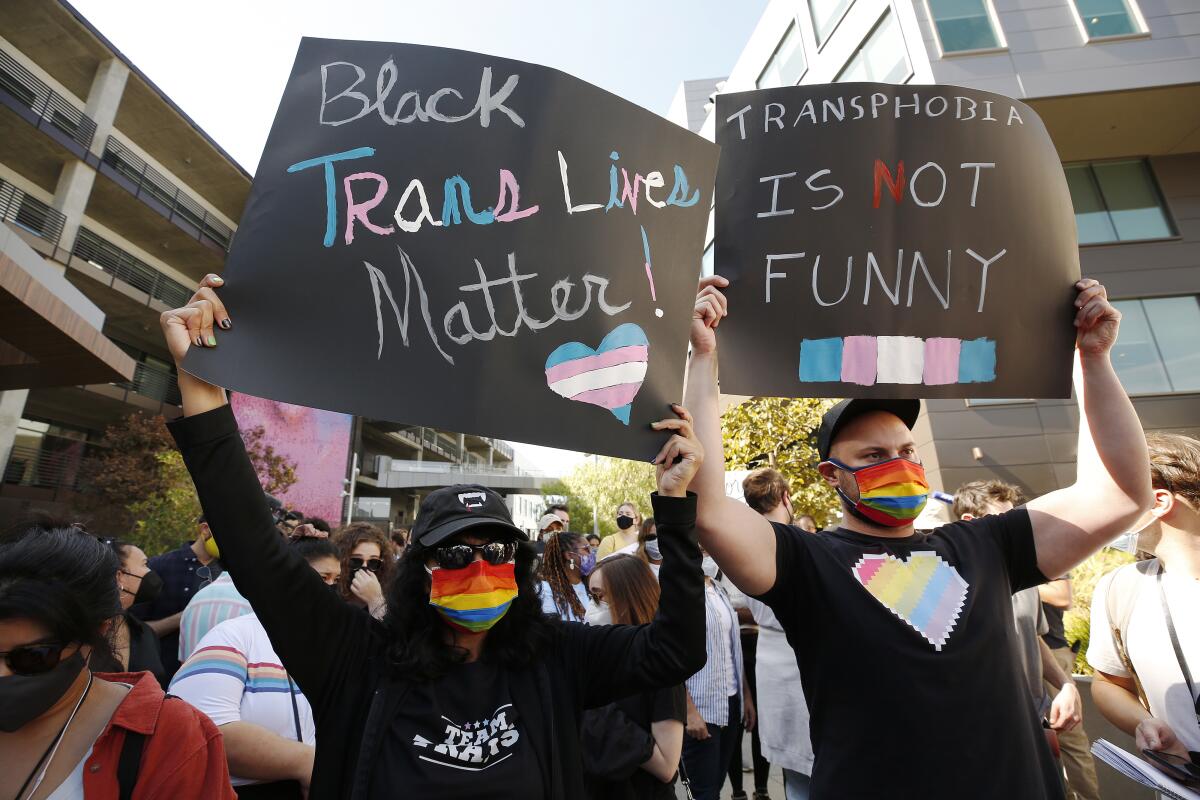Netflix’s message to employees and ‘woke’ Hollywood’s retreat

This is the May 17, 2022, edition of the Wide Shot newsletter about the business of entertainment. If this was forwarded to you, sign up here to get it in your inbox.
Amid the cultural melee over Netflix’s decision to carry Dave Chappelle’s “The Closer,” despite its anti-trans jokes, co-Chief Executive Ted Sarandos admitted he “screwed up” in his communication with employees about the issue.
When higher-ups apologize for the way they’ve conveyed their company’s policy, that’s often a sign that their position on the underlying matter has not changed. That rule certainly holds true for Netflix, according to new language in its corporate culture guidelines for staff, revised last week for the first time since 2017.
The memo includes a not very subtle new message: If you can’t work on shows you find objectionable, there’s the door. “We let viewers decide what’s appropriate for them, versus having Netflix censor specific artists or voices,” reads the updated portion of Netflix’s guidelines subtitled “Artistic Expression.”
“As employees we support the principle that Netflix offers a diversity of stories, even if we find some titles counter to our own personal values. Depending on your role, you may need to work on titles you perceive to be harmful. If you’d find it hard to support our content breadth, Netflix may not be the best place for you.”
So much for “woke” Hollywood.
In keeping with its famously blunt culture, Netflix’s message effectively codifies the policy Sarandos originally expressed, which sparked outrage from LGBTQ activists and some employees, who protested Netflix’s support of Chappelle with a virtual walkout and a tense gathering in front of the company’s Los Angeles offices on Sunset Boulevard. Netflix, it’s worth pointing out, also took heat from the right for releasing the indie movie “Cuties,” which conservatives accused of sexualizing kids.

During the last few weeks, the entertainment industry has undergone a gradual retrenchment from liberal social activism at the corporate level, at least when it comes to making grand public statements on specific issues.
Companies that issued unreserved statements of support during the Black Lives Matter protests in response to the murder of George Floyd have said next to nothing about the U.S. Supreme Court’s probable overturning of Roe vs. Wade. This, even though Sarandos in 2019 signaled he would “rethink” filming in Georgia if the Peach State’s highly restrictive abortion law went into effect. Walt Disney Co.’s then-CEO Bob Iger said it would be “very difficult” to do business there, despite the tax breaks the company receives.
Perhaps it was easier to take such a stance at a time when it was reasonable to expect courts to declare the Georgia law unconstitutional. It’s a lot harder to put those words into action now that the constitutional protection for abortion is, by all indications after the leak of Justice Samuel Alito’s draft opinion, about to be dismantled.
Don’t hold your breath waiting for studios to pull productions out of states with conservative abortion laws (or outright bans, as would be the case in many places if Roe were overturned), especially after Disney’s political misadventure in Florida over the state’s Parental Rights in Education legislation.
By deciding to condemn the Florida law, nicknamed “Don’t Say Gay” legislation by its opponents, Disney’s brass sparked weeks of shock-and-awe attacks from Gov. Ron DeSantis and conservative media, including Fox News. The state legislature briskly passed a law to dissolve the Reedy Creek Improvement District in retaliation, setting the stage to eliminate what essentially gave Disney self-governing status in the central Florida area that includes Walt Disney World.
Until very recently, few politicians in Florida would have targeted Disney, given its importance to the state as an employer, a driver of tourism and a contributor to political campaigns. Not anymore. If anything, attacking Disney for its “woke” agenda has elevated DeSantis’ national profile and shown his tactical skill in a way that ought to worry anyone planning to run a Democratic presidential campaign in 2024.
Disney has remained silent on the Reedy Creek ordeal, clearly believing that speaking up will only fan the flames further. A group of Florida taxpayers filed a lawsuit against the state over its planned dissolution of the district, but a federal judge tossed their complaint over jurisdictional issues. The plaintiffs on Monday filed their suit in state court.
No wonder other companies are skittish. Republican politicians, playing to a culturally conservative base, have not hesitated to hammer private firms such as Disney over internal diversity initiatives (labeled by conservative activist Christopher Rufo as akin to “critical race theory”) and efforts to include LGBTQ themes in content. They’re even going after Mickey Mouse’s copyright protections.
Disney only spoke out in the first place because it was under pressure from employees who were furious about CEO Bob Chapek’s silence. By waging “moral war” on Disney, Rufo and DeSantis have given other companies a convenient excuse to keep tight-lipped about political third rails, no matter how loudly employees revolt.
In some ways, this is merely a return to the approach that was common in corporate America several years ago.
Netflix has been discussing these culture issues internally for 18 months, a company spokesman said. During that time, Netflix solicited feedback from employees and received more than 1,000 comments about the document, which is aimed at prospective employees as much as it is meant for current staffers. In other words, know before you go.
Notably, it comes after Chappelle was attacked onstage at the Hollywood Bowl during the company’s Netflix Is a Joke Fest, reviving the conversation about protecting comedians no matter what verbal offenses they commit.
This comes as Netflix is dealing with questions over the sustainability of its business model after the Los Gatos, Calif., streamer reported its first subscriber loss in more than a decade, prompting a massive sell-off of its stock. Netflix has already indicated it will control costs more tightly and has enacted some layoffs, and many in the industry are expecting more cuts to come. Hollywood doesn’t want another headache.
Stuff we wrote
— Brady goes to the booth. NFL players turned broadcasters have warnings for Tom Brady when he enters his TV commentator stage. Writes Sam Farmer, “Everybody has to start somewhere and, if history is a guide, Brady will go through some growing pains the way every analyst does.”
— Academy member on trial over child molestation charges draws scrutiny. Stacy Perman highlights the trial of Jeffrey Cooper, a renowned architect and acoustic engineer who stands accused of sexually molesting two minors.
— Another blow for movie lovers as Landmark Theatres prepares to close its flagship Pico Boulevard location.
— More headlines. Chicken Soup for the Soul to buy Redbox. Golden Globes member alleges he was a victim of racism, and abuse at Hollywood Foreign Press Assn. Michael Hiltzik column: Disney allegedly has cheated hundreds of writers out of pay for Star Wars and other properties. ‘Rust’ producers plan to complete the movie after the sheriff’s investigation concludes.
Number of the week

Maybe the great streaming slump of 2022 is really just a Netflix problem for now.
Walt Disney Co. last week reported that Disney+ added 7.9 million subscribers during the most recent quarter, beating Wall Street expectations amid worries that the direct-to-consumer video business may not be as big or lucrative as analysts once thought.
Really, though, the Disney+ numbers change little about the big-picture streaming questions. They do indicate that Disney+, having reached 137.7 million subscribers in less than three years, still has room to grow, even though Netflix (the market leader at 222 million subscribers) is hitting a wall. Streaming is still incredibly expensive. Disney said its direct-to-consumer business lost nearly $900 million in the second quarter. In the third quarter, the company expects losses to grow by $900 million year-over-year.
More than half of Disney+’s new subscribers came in through the very inexpensive Disney+Hotstar combo, which doesn’t add much to the company’s bottom line. Its growth also is partly dependent on its ability to broadcast Indian Premier League cricket games, which it may lose after the media rights auction.
Disney restated its goal of hitting 230 million to 260 million Disney+ subscribers by 2024 and also making the service profitable by that same time. Analysts are no more confident than they were a week ago that the company will reach those goals. Doug Creutz of Cowen & Co. wrote to clients that “growth was better than feared in the wake of the Netflix report, but likely not so strong as to convince skeptics (including us) that the company is comfortably on track” to hit its targets.
There’s always the possibility that the Netflix worries are an overreaction. Longtime Netflix skeptic Michael Pachter of Wedbush Securities on Monday upgraded his rating to “outperform” as the stock sank well below his price target for the company. Netflix has its problems but is “beginning to address them” with measures such as breaking up the seasons of its biggest shows, Pachter wrote.
You should be reading...
— Dave Itzkoff on the strange afterlife of George Carlin. (New York Times)
— Kat Tenbarge on YouTube and TikTok creators pivoting hard to the Johnny Depp-Amber Heard trial. (NBC News)
— Parrot Analytics on who’s dominating in unscripted streaming.
— “The Good One” podcast on how the right makes comedy work for it. (Vulture)
— Borys Kit on the slow-moving CAA-ICM merger and “deal fatigue.” (Hollywood Reporter)
— Marc Tracy on how Hollywood propelled J.D. Vance to new heights. (New York Times)
Finally...
Kendrick Lamar’s new album is here. Of course you’ve heard about it. But the new release from Florence + the Machine, titled “Dance Fever,” is not to be missed.
Inside the business of entertainment
The Wide Shot brings you news, analysis and insights on everything from streaming wars to production — and what it all means for the future.
You may occasionally receive promotional content from the Los Angeles Times.




